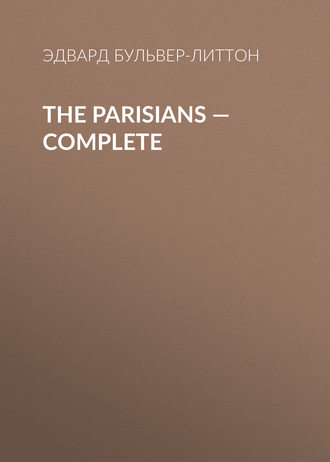
Эдвард Бульвер-Литтон
The Parisians — Complete
CHAPTER III
“Mr. Vane, I feel as if I had many apologies to make for the interest in your life which my letter to you so indiscreetly betrayed.”
“Oh, Mrs. Morley! you cannot guess how deeply that interest touched me.”
“I should not have presumed so far,” continued Mrs. Morley, unheeding the interruption, “if I had not been altogether in error as to the nature of your sentiments in a certain quarter. In this you must blame my American rearing. With us there are many flirtations between boys and girls which come to nothing; but when in my country a man like you meets with a woman like Mademoiselle Cicogna, there cannot be flirtation. His attentions, his looks, his manner, reveal to the eyes of those who care enough for him to watch, one of two things—either he coldly admires and esteems, or he loves with his whole heart and soul a woman worthy to inspire such a love. Well, I did watch, and I was absurdly mistaken. I imagined that I saw love, and rejoiced for the sake of both of you to think so. I know that in all countries, our own as well as yours, love is so morbidly sensitive and jealous that it is always apt to invent imaginary foes to itself. Esteem and admiration never do that. I thought that some misunderstanding, easily removed by the intervention of a third person, might have impeded the impulse of two hearts towards each other—and so I wrote. I had assumed that you loved—I am humbled to the last degree—you only admired and esteemed.”
“Your irony is very keen, Mrs. Morley, and to you it may seem very just.”
“Don’t call me Mrs. Morley in that haughty tone of voice,—can’t you talk to me as you would talk to a friend? You only esteemed and admired—there is an end of it.”
“No, there is not an end of it,” cried Graham, giving way to an impetuosity of passion, which rarely, indeed, before another, escaped his self-control; “the end of it to me is a life out of which is ever stricken such love as I could feel for woman. To me true love can only come once. It came with my first look on that fatal face—it has never left me in thought by day, in dreams by night. The end of it to me is farewell to all such happiness as the one love of a life can promise—but—”
“But what?” asked Mrs. Morley, softly, and very much moved by the passionate earnestness of Graham’s voice and words.
“But,” he continued with a forced smile, “we Englishmen are trained to the resistance of absolute authority; we cannot submit all the elements that make up our being to the sway of a single despot. Love is the painter of existence, it should not be its sculptor.”
“I do not understand the metaphor.”
“Love colours our life, it should not chisel its form.”
“My dear Mr. Vane, that is very cleverly said, but the human heart is too large and too restless to be quietly packed up in an aphorism. Do you mean to tell me that if you found you had destroyed Isaura Cicogna’s happiness as well as resigned your own, that thought would not somewhat deform the very shape you would give to your life? Is it colour alone that your life would lose?”
“Ah, Mrs. Morley, do not lower your friend into an ordinary girl in whom idleness exaggerates the strength of any fancy over which it dreamily broods. Isaura Cicogna has her occupations—her genius—her fame—her career. Honestly speaking, I think that in these she will find a happiness that no quiet hearth could bestow. I will say no more. I feel persuaded that were we two united I could not make her happy. With the irresistible impulse that urges the genius of the writer towards its vent in public sympathy and applause, she would chafe if I said, ‘Be contented to be wholly mine.’ And if I said it not, and felt I had no right to say it, and allowed the full scope to her natural ambition, what then? She would chafe yet more to find that I had no fellowship in her aims and ends—that where I should feel pride, I felt humiliation. It would be so; I cannot help it, ‘tis my nature.”
“So be it then. When, next year perhaps, you visit Paris, you will be safe from my officious interference! Isaura will be the wife of another.”
Graham pressed his hand to his heart with the sudden movement of one who feels there an agonising spasm—his cheek, his very lips were bloodless.
“I told you,” he said bitterly, “that your fears of my influence over the happiness of one so gifted, and so strong in such gifts, were groundless; you allow that I should be very soon forgotten?”
“I allow no such thing—I wish I could. But do you know so little of a woman’s heart (and in matters of heart, I never yet heard that genius had a talisman against emotion),—do you know so little of a woman’s heart as not to know that the very moment in which she may accept a marriage the least fitted to render her happy, is that in which she has lost all hope of happiness in another?”
“Is it indeed so?” murmured Graham—“Ay, I can conceive it.”
“And have you so little comprehension of the necessities which that fame, that career to which you allow she is impelled by the instincts of genius, impose on this girl, young, beautiful, fatherless, motherless? No matter how pure her life, can she guard it from the slander of envious tongues? Will not all her truest friends—would not you, if you were her brother—press upon her by all the arguments that have most weight with the woman who asserts independence in her modes of life, and yet is wise enough to know that the world can only judge of virtue by its shadow—reputation, not to dispense with the protection which a husband can alone secure? And that is why I warn you, if it be yet time, that in resigning your own happiness you may destroy Isaura’s. She will wed another, but she will not be happy. What a chimera or dread your egotism as man conjures up! Oh! forsooth, the qualities that charm and delight a world are to unfit a woman to be helpmate to a man. Fie on you!—fie!”
Whatever answer Graham might have made to these impassioned reproaches was here checked.
Two men on horseback stopped the carriage. One was Enguerrand de Vandemar, the other was the Algerine Colonel whom we met at the supper given at the Maison Doree by Frederic Lemercier.
“Pardon, Madame Morley,” said Enguerrand; “but there are symptoms of a mob-epidemic a little further up the fever began at Belleville, and is threatening the health of the Champs Elysees. Don’t be alarmed—it may be nothing, though it may be much. In Paris, one can never calculate an hour beforehand the exact progress of a politico-epidemic fever. At present I say, ‘Bah! a pack of ragged boys, gamins de Paris;’ but my friend the Colonel, twisting his moustache en souriant amerement, says, ‘It is the indignation of Paris at the apathy of the Government under insult to the honour of France;’ and Heaven only knows how rapidly French gamins grow into giants when Colonels talk about the indignation of Paris and the honour of France!”
“But what has happened?” asked Mrs. Morley, turning to the Colonel.
“Madame,” replied the warrior, “it is rumoured that the King of Prussia has turned his back upon the ambassador of France; and that the pekin who is for peace at any price—M. Ollivier—will say tomorrow in the Chamber, that France submits to a slap in the face.”
“Please, Monsieur de Vandemar, to tell my coachman to drive home,” said Mrs. Morley.
The carriage turned and went homeward. The Colonel lifted his hat, and rode back to see what the gamins were about. Enguerrand, who had no interest in the gamins, and who looked on the Colonel as a bore, rode by the side of the carriage.
“Is there anything serious in this?” asked Mrs. Morley.
“At this moment, nothing. What it may be this hour to-morrow I cannot say. Ah! Monsieur Vane, bon jour I did not recognise you at first. Once, in a visit at the chateau of one of your distinguished countrymen, I saw two game-cocks turned out facing each other: they needed no pretext for quarrelling—neither do France and Prussia—no matter which game-cock gave the last offence, the two game-cocks must have it out. All that Ollivier can do, if he be wise, is to see that the French cock has his steel spurs as long as the Prussians. But this I do say, that if Ollivier attempts to put the French cock back into its bag, the Empire is gone in forty-eight hours. That to me is a trifle—I care nothing for the Empire; but that which is not a trifle is anarchy and chaos. Better war and the Empire than peace and Jules Favre. But let us seize the present hour, Mr. Vane; whatever happens to-morrow, shall we dine together to-day? Name your restaurant.”
“I am so grieved,” answered Graham, rousing himself, “I am here only on business, and engaged all the evening.”
“What a wonderful thing is this life of ours!” said Enguerrand. “The destiny of France at this moment hangs on a thread—I, a Frenchman, say to an English friend, ‘Let us dine—a cutlet to-day and a fig for to-morrow;’ and my English friend, distinguished native of a country with which we have the closest alliance, tells me that in this crisis of France he has business to attend to! My father is quite right; he accepts the Voltairean philosophy, and cries, Vivent les indifferents!”
“My dear M. de Vandemar,” said Graham, “in every country you will find the same thing. All individuals massed together constitute public life. Each individual has a life of his own, the claims and the habits and the needs of which do not suppress his sympathies with public life, but imperiously overrule them. Mrs. Morley, permit me to pull the check-string—I get out here.”
“I like that man,” said Enguerrand, as he continued to ride by the fair American, “in language and esprit he is so French.”
“I use to like him better than you can,” answered Mrs. Morley, “but in prejudice and stupidity he is so English. As it seems you are disengaged, come and partake, pot au feu, with Frank and me.”
“Charmed to do so,” answered the cleverest and best bred of all Parisian beaux garcons, “but forgive me if I quit you soon. This poor France! Entre nous, I am very uneasy about the Parisian fever. I must run away after dinner to clubs and cafes to learn the last bulletins.”
“We have nothing like that French Legitimist in the States,” said the fair American to herself, “unless we should ever be so silly as to make Legitimists of the ruined gentlemen of the South.”
Meanwhile Graham Vane went slowly back to his apartment. No false excuse had he made to Enguerrand; this evening was devoted to M. Renard, who told him little he had not known before; but his private life overruled his public, and all that night he, professed politician, thought sleeplessly, not over the crisis to France, which might alter the conditions of Europe, but the talk on his private life of that intermeddling American woman.
CHAPTER IV
The next day, Wednesday, July 6th, commenced one of those eras in the world’s history in which private life would vainly boast that it overrules Life Public. How many private lives does such a terrible time influence, absorb, darken with sorrow, crush into graves?
It was the day when the Duc de Gramont uttered the fatal speech which determined the die between peace and war. No one not at Paris on that day can conceive the popular enthusiasm with which that speech was hailed—the greater because the warlike tone of it was not anticipated; because there had been a rumour amidst circles the best informed that a speech of pacific moderation was to be the result of the Imperial Council. Rapturous indeed were the applauses with which the sentences that breathed haughty defiance were hailed by the Assembly. The ladies in the tribune rose with one accord, waving their handkerchiefs. Tall, stalwart, dark, with Roman features and lofty presence, the Minister of France seemed to say with Catiline in the fine tragedy: “Lo! where I stand, I am war!”
Paris had been hungering for some hero of the hour—the Duc de Gramont became at once raised to that eminence. All the journals, save the very few which were friendly to peace, because hostile to the Emperor, resounded with praise, not only of the speech, but of the speaker. It is with a melancholy sense of amusement that one recalls now to mind those organs of public opinion—with what romantic fondness they dwelt on the personal graces of the man who had at last given voice to the chivalry of France: “The charming gravity of his countenance—the mysterious expression of his eye!”
As the crowd poured from the Chambers, Victor de Mauleon and Savarin, who had been among the listeners, encountered.
“No chance for my friends the Orleanists now,” said Savarin. “You who mock at all parties are, I suppose, at heart for the Republican—small chance, too, for that.”
“I do not agree with you. Violent impulses have quick reactions.”
“But what reaction could shake the Emperor after he returns a conqueror, bringing in his pocket the left bank of the Rhine?”
“None—when he does that. Will he do it? Does he himself think he will do it? I doubt—”
“Doubt the French army against the Prussian?”
“Against the German people united—yes, very much.”
“But war will disunite the German people. Bavaria will surely assist us—Hanover will rise against the spoliator—Austria at our first successes must shake off her present enforced neutrality?”
“You have not been in Germany, and I have. What yesterday was a Prussian army, to-morrow will be a German population; far exceeding our own in numbers, in hardihood of body, in cultivated intellect, in military discipline. But talk of something else. How is my ex-editor—poor Gustave Rameau?”
“Still very weak, but on the mend. You may have him back in his office soon.”
“Impossible! even in his sick-bed his vanity was more vigorous than ever. He issued a war-song, which has gone the round of the war journals signed by his own name. He must have known very well that the name of such a Tyrtaeus cannot reappear as the editor of Le Sens Commun; that in launching his little firebrand he burned all vessels that could waft him back to the port he had quitted. But I dare say he has done well for his own interests; I doubt if Le Sens Commun can much longer hold its ground in the midst of the prevalent lunacy.”
“What! it has lost subscribers?—gone off in sale already, since it declared for peace?”
“Of course it has; and after the article which, if I live over to-night, will appear to-morrow, I should wonder if it sell enough to cover the cost of the print and paper.”
“Martyr to principle! I revere, but I do not envy thee.”
“Martyrdom is not my ambition. If Louis Napoleon be defeated, what then? Perhaps he may be the martyr; and the Favres and Gambettas may roast their own eggs on the gridiron they heat for his majesty.”
Here an English gentleman, who was the very able correspondent to a very eminent journal, and in that capacity had made acquaintance with De Mauleon, joined the two Frenchmen; Savarin, however, after an exchange of salutations, went his way.
“May I ask a frank answer to a somewhat rude question, M. le Vicomte?” said the Englishman. “Suppose that the Imperial Government had to-day given in their adhesion to the peace party, how long would it have been before their orators in the Chamber and their organs in the press would have said that France was governed by poltrons?”
“Probably for most of the twenty-four hours. But there are a few who are honest in their convictions; of that few I am one.”
“And would have supported the Emperor and his Government?”
“No, Monsieur—I do not say that.”
“Then the Emperor would have turned many friends into enemies, and no enemies into friends.”
“Monsieur—you in England know that a party in opposition is not propitiated when the party in power steals its measures. Ha!—pardon me, who is that gentleman, evidently your countryman, whom I see yonder talking to the Secretary of your Embassy?”
“He.—Mr. Vane-Graham Vane. Do you not know him? He has been much in Paris, attached to our Embassy formerly; a clever man—much is expected from him.”
“Ah! I think I have seen him before, but am not quite sure. Did you say Vane? I once knew a Monsieur Vane, a distinguished parliamentary orator.”
“That gentleman is his son—would you like to be introduced to him?”
“Not to-day—I am in some hurry.” Here Victor lifted his hat in parting salutation, and as he walked away cast at Graham another glance keen and scrutinising. “I have seen that man before,” he muttered, “where?—when?—can it be only a family likeness to the father? No, the features are different; the profile is—ha!—Mr. Lamb, Mr. Lamb—but why call himself by that name?—why disguised?—what can he have to do with poor Louise? Bah—these are not questions I can think of now. This war—this war—can it yet be prevented? How it will prostrate all the plans my ambition so carefully schemed! Oh!—at least if I were but in the Chamber. Perhaps I yet may be before the war is ended—the Clavignys have great interest in their department.”
CHAPTER V
Graham had left a note with Rochebriant’s concierge requesting an interview on the Marquis’s return to Paris, and on the evening after the day just commemorated he received a line, saying that Alain had come back, and would be at home at nine o’clock. Graham found himself in the Breton’s apartment punctually at the hour indicated.
Alain was in high spirits: he burst at once into enthusiastic exclamations on the virtual announcement of war.
“Congratulate me, mon cher!” he cried—“the news was a joyous surprise to me. Only so recently as yesterday morning I was under the gloomy apprehension that the Imperial Cabinet would continue to back Ollivier’s craven declaration ‘that France had not been affronted!’ The Duchesse de Tarascon, at whose campagne I was a guest, is (as you doubtless know) very much in the confidence of the Tuileries. On the first signs of war, I wrote to her, saying that whatever the objections of my pride to enter the army as a private in time of peace, such objections ceased on the moment when all distinctions of France must vanish in the eyes of sons eager to defend her banners. The Duchesse in reply begged me to come to her campagne and talk over the matter. I went; she then said that if war should break out it was the intention to organise the Mobiles and officer them with men of birth and education, irrespective of previous military service, and in that case I might count on my epaulets. But only two nights ago she received a letter—I know not of course from whom—evidently from some high authority—that induced her to think the moderation of the Council would avert the war, and leave the swords of the Mobiles in their sheaths. I suspect the decision of yesterday must have been a very sudden one. Ce cher Gramont! See what it is to have a well-born man in a sovereign’s councils.”
“If war must come, I at least wish all renown to yourself. But—”
“Oh! spare me your ‘buts’; the English are always too full of them where her own interests do not appeal to her. She had no ‘buts’ for war in India or a march into Abyssinia.”
Alain spoke petulantly; at that moment the French were very much irritated by the monitory tone of the English journals. Graham prudently avoided the chance of rousing the wrath of a young hero yearning for his epaulets.
“I am English enough,” said he, with good-humoured courtesy, “to care for English interests; and England has no interest abroad dearer to her than the welfare and dignity of France. And now let me tell you why I presumed on an acquaintance less intimate than I could desire, to solicit this interview on a matter which concerns myself, and in which you could perhaps render me a considerable service.”
“If I can, count it rendered; move to this sofa—join me in a cigar, and let us talk at ease comme de vieux amis, whose fathers or brothers might have fought side by side in the Crimea.” Graham removed to the sofa beside Rochebriant, and after one or two whiffs laid aside the cigar and began:
“Among the correspondence which Monsieur your father has left, are there any letters of no distant date signed Marigny—Madame Marigny? Pardon me, I should state my motive in putting this question. I am intrusted with a charge, the fulfilment of which may prove to the benefit of this lady or her child; such fulfilment is a task imposed upon my honour. But all the researches to discover this lady which I have instituted stop at a certain date, with this information,—viz., that she corresponded occasionally with the late Marquis de Rochebriant; that he habitually preserved the letters of his correspondents; and that these letters were severally transmitted to you at his decease.”
Alain’s face had taken a very grave expression while Graham spoke, and he now replied with a mixture of haughtiness and embarrassment:
“The boxes containing the letters my father received and preserved were sent to me as you say—the larger portion of them were from ladies—sorted and labelled, so that in glancing at any letter in each packet I could judge of the general tenor of these in the same packet without the necessity of reading them. All packets of that kind, Monsieur Vane, I burned. I do not remember any letters signed ‘Marigny!”
“I perfectly understand, my dear Marquis, that you would destroy all letters which your father himself would have destroyed if his last illness had been sufficiently prolonged. But I do not think the letters I mean would have come under that classification; probably they were short, and on matters of business relating to some third person—some person, for instance, of the name of Louise, or of Duval!”
“Stop! let me think. I have a vague remembrance of one or two letters which rather perplexed me, they were labelled, ‘Louise D—. Mem.: to make further inquiries as to the fate of her uncle.’”
“Marquis, these are the letters I seek. Thank heaven, you have not destroyed them?”
“No; there was no reason why I should destroy, though I really cannot state precisely any reason why I kept them. I have a very vague recollection of their existence.”
“I entreat you to allow me at least a glance at the handwriting, and compare it with that of a letter I have about me; and if the several handwritings correspond, I would ask you to let me have the address, which, according to your father’s memorandum, will be found in the letters you have preserved.”
“To compliance with such a request I not only cannot demur, but perhaps it may free me from some responsibility which I might have thought the letters devolved upon my executorship. I am sure they did not concern the honour of any woman of any family, for in that case I must have burned them.”
“Ah, Marquis, shake hands there! In such concord between man and man, there is more entente cordiale between England and France than there was at Sebastopol. Now let me compare the handwritings.”
“The box that contained the letters is not here—I left it at Rochebriant; I will telegraph to my aunt to send it; the day after to-morrow it will no doubt arrive. Breakfast with me that day—say at one o’clock, and after breakfast the Box!”
“How can I thank you?”
“Thank me! but you said your honour was concerned in your request—requests affecting honour between men comma il faut is a ceremony of course, like a bow between them. One bows, the other returns the bow—no thanks on either side. Now that we have done with that matter, let me say that I thought your wish for our interview originated in a very different cause.”
“What could that be?”
“Nay, do you not recollect that last talk between us, when with such loyalty you spoke to me about Mademoiselle Cicogna, and supposing that there might be rivalship between us, retracted all that you might have before said to warn me against fostering the sentiment with which she had inspired me; even at the first slight glance of a face which cannot be lightly forgotten by those who have once seen it.”
“I recollect perfectly every word of that talk, Marquis,” answered Graham, calmly, but with his hand concealed within his vest and pressed tightly to his heart. The warning of Mrs. Morley flashed upon him. “Was this the man to seize the prize he had put aside—this man, younger than himself—handsomer than himself—higher in rank?”
“I recollect that talk, Marquis! Well, what then?”
“In my self-conceit I supposed that you might have heard how much I admired Mademoiselle Cicogna—how, having not long since met her at the house of Duplessis (who by the way writes me word that I shall meet you chez lui tomorrow), I have since sought her society wherever there was a chance to find it. You may have heard, at our club, or elsewhere, how I adore her genius—how, I say, that nothing so Breton—that is, so pure and so lofty—has appeared and won readers since the days of Chateaubriand,—and—you, knowing that les absents ont toujours tort, come to me and ask Monsieur de Rochebriant, Are we rivals? I expected a challenge—you relieve my mind—you abandon the field to me?”
At the first I warned the reader how improved from his old mauvaise honte a year or so of Paris life would make our beau Marquis. How a year or two of London life with its horsey slang and its fast girls of the period would have vulgarised an English Rochebriant! Graham gnawed his lips and replied quietly, “I do not challenge! Am I to congratulate you?”
“No, that brilliant victory is not for me. I thought that was made clear in the conversation I have referred to. But if you have done me the honour to be jealous I am exceedingly flattered. Speaking, seriously, if I admired Mademoiselle Cicogna when you and I last met, the admiration is increased by the respect with which I regard a character so simply noble. How many women older than she would have been spoiled by the adulation that has followed her literary success!—how few women so young, placed in a position so critical, having the courage to lead a life so independent, would have maintained the dignity of their character free from a single indiscretion! I speak not from my own knowledge, but from the report of all, who would be pleased enough to censure if they could find a cause. Good society is the paradise of mauvaises langues.”
Graham caught Alain’s hand and pressed it, but made no answer.
The young Marquis continued:
“You will pardon me for speaking thus freely in the way that I would wish any friend to speak of the demoiselle who might become my wife. I owe you much, not only for the loyalty with which you address me in reference to this young lady, but for words affecting my own position in France, which sank deep into my mind—saved me from deeming myself a proscrit in my own land—filled me with a manly ambition, not stifled amidst the thick of many effeminate follies—and, in fact, led me to the career which is about to open before me, and in which my ancestors have left me no undistinguished examples. Let us speak, then, a coeur ouvert, as one friend to another. Has there been any misunderstanding between you and Mademoiselle Cicogna which has delayed your return to Paris? If so, is it over now?”
“There has been no such misunderstanding.”
“Do you doubt whether the sentiments you expressed in regard to her when we met last year, are returned?”
“I have no right to conjecture her sentiments. You mistake altogether.”
“I do not believe that I am dunce enough to mistake your feelings towards Mademoiselle—they may be read in your face at this moment. Of course I do not presume to hazard a conjecture as to those of Mademoiselle towards yourself. But when I met her not long since at the house of Duplessis, with whose daughter she is intimate, I chanced to speak to her of you; and if I may judge, by looks and manner, I chose no displeasing theme. You turn away—I offend you?”
“Offend!—no, indeed; but on this subject I am not prepared to converse. I came to Paris on matters of business much complicated and which ought to absorb my attention. I cannot longer trespass on your evening. The day after to-morrow, then, I will be with you at one o’clock.”
“Yes, I hope then to have the letters you wish to consult; and, meanwhile, we meet to-morrow at the Hotel Duplessis.”







